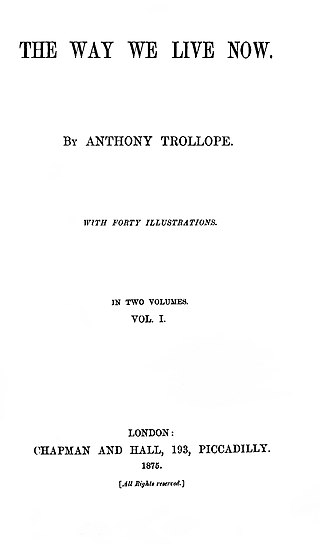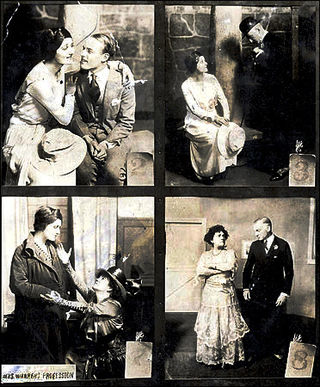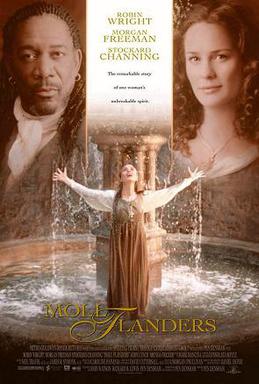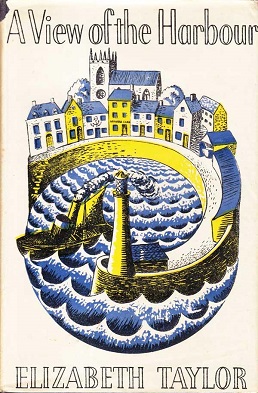
Sense and Sensibility is a novel by Jane Austen, published in 1811. It was published anonymously; By A Lady appears on the title page where the author's name might have been. It tells the story of the Dashwood sisters, Elinor and Marianne as they come of age. They have an older half-brother, John, and a younger sister, Margaret.

Emma is a novel written by Jane Austen. It is set in the fictional country village of Highbury and the surrounding estates of Hartfield, Randalls and Donwell Abbey, and involves the relationships among people from a small number of families. The novel was first published in December 1815, with its title page listing a publication date of 1816. As in her other novels, Austen explores the concerns and difficulties of genteel women living in Georgian–Regency England. Emma is a comedy of manners.

A brothel, bordello, ranch, or whorehouse is a place where people engage in sexual activity with prostitutes. However, for legal or cultural reasons, establishments often describe themselves as massage parlors, bars, strip clubs, body rub parlours, studios, or by some other description. Sex work in a brothel is considered safer than street prostitution.

Lady Susan is an epistolary novella by Jane Austen, possibly written in 1794 but not published until 1871. This early complete work, which the author never submitted for publication, describes the schemes of the title character.

Child prostitution is prostitution involving a child, and it is a form of commercial sexual exploitation of children. The term normally refers to prostitution of a minor, or person under the legal age of consent. In most jurisdictions, child prostitution is illegal as part of general prohibition on prostitution.

The Way We Live Now is a satirical novel by Anthony Trollope, published in London in 1875 after first appearing in serialised form. It is one of the last significant Victorian novels to have been published in monthly parts.

Emma Donoghue is an Irish-Canadian playwright, literary historian, novelist, and screenwriter. Her 2010 novel Room was a finalist for the Booker Prize and an international best-seller. Donoghue's 1995 novel Hood won the Stonewall Book Award and Slammerkin (2000) won the Ferro-Grumley Award for Lesbian Fiction. She is a 2011 recipient of the Alex Awards. Room was adapted by Donoghue into a film of the same name. For this, she was nominated for the Academy Award for Best Adapted Screenplay.

Mrs. Warren's Profession is a play written by George Bernard Shaw in 1893, and first performed in London in 1902. It is one of the three plays Shaw published as Plays Unpleasant in 1898, alongside The Philanderer and Widowers' Houses. The play is about a former prostitute, now a madam, who attempts to come to terms with her disapproving daughter. It is a problem play, offering social commentary to illustrate Shaw's belief that the act of prostitution was not caused by moral failure but by economic necessity. Elements of the play were borrowed from Shaw's 1882 novel Cashel Byron's Profession, about a man who becomes a boxer due to limited employment opportunities.

Emma is a 1996 period comedy film based on the 1815 novel of the same name by Jane Austen. Written and directed by Douglas McGrath, the film stars Gwyneth Paltrow, Alan Cumming, Toni Collette, Ewan McGregor, and Jeremy Northam.

Deceived is a 1991 American psychological thriller film directed by Damian Harris. The script was written by Mary Agnes Donoghue and rewritten by Bruce Joel Rubin. Goldie Hawn and John Heard star as a happily married couple whose lives are disrupted when secrets from the past are revealed.
Antonia White was a British writer and translator, known primarily for Frost in May, a semi-autobiographical novel set in a convent school. It was the first book reissued by Virago Press in 1978, as part of their Modern Classics series of books by previously neglected women authors.
Annabel Mullion is an actress. She was educated at St Mary's School, Ascot and studied English and Drama at the University of East Anglia. She then completed the 3 year acting course at Central School of Speech and Drama, graduating in 1994. She won the Carleton Hobbs Bursary Award in that year as well.

Moll Flanders is a 1996 American period drama film starring Robin Wright and Morgan Freeman, loosely based on the 1722 novel of the same name by Daniel Defoe. The film, which vastly differs from the original novel, was written and directed by Pen Densham. The original music score was composed by Mark Mancina.

Emma is a four-part BBC television drama serial adaptation of Jane Austen's 1815 novel Emma. The episodes were written by Sandy Welch, writer of previous BBC costume dramas Jane Eyre and North & South, and directed by Jim O'Hanlon. The serial stars Romola Garai as the titular heroine Emma Woodhouse, Jonny Lee Miller as her loyal lifelong friend Mr. Knightley, and Michael Gambon as Emma's father, Mr. Woodhouse. The serial originally ran weekly on Sunday nights on BBC One from 4 to 25 October 2009.

Jack the Ripper is a 1988 Anglo-American co-production by Thames Television and CBS television film drama based on the notorious Jack the Ripper murder spree in Victorian London. It was first broadcast on ITV.
Parents Against Child Exploitation (Pace) is a charitable organisation in England and Wales that works with parents of children who have been, or are at risk of being, sexually or criminally exploited. The charity was founded in 1996 as the Coalition for the Removal of Pimping (CROP) by Irene Ivison and other affected parents following the murder of Ivison's 17-year-old daughter Fiona in Doncaster.

Mrs. Palfrey at the Claremont is a novel by Elizabeth Taylor. Published in 1971, it was her eleventh novel. It was shortlisted for the 1971 Booker Prize. The novel was adapted for television in 1973 and was the basis for a 2005 film, also called Mrs. Palfrey at the Claremont.

Priss Fotheringham was an English sex worker and madam from London who was described in a number of publications from the 1660s. One publication, The Wandering Whore, described her as the 'second best whore in the city'. An unofficial blue plaque commemorating her was installed in 2012 at the corner of Whitecross Street and Old Street in East London, but was reported in January 2023 to have "recently been obscured by a new artwork". As of 26 July 2023 the artwork had been changed and the unofficial blue plaque moved, so it is visible below the new artwork.

A View of the Harbour is a novel by Elizabeth Taylor. First published in 1947 in England and the United States, it was her third novel. It is the first of her novels in which one of the main characters is a creative artist. The relationship of the artist to society and other people was to be an important theme in Taylor's subsequent work.
















